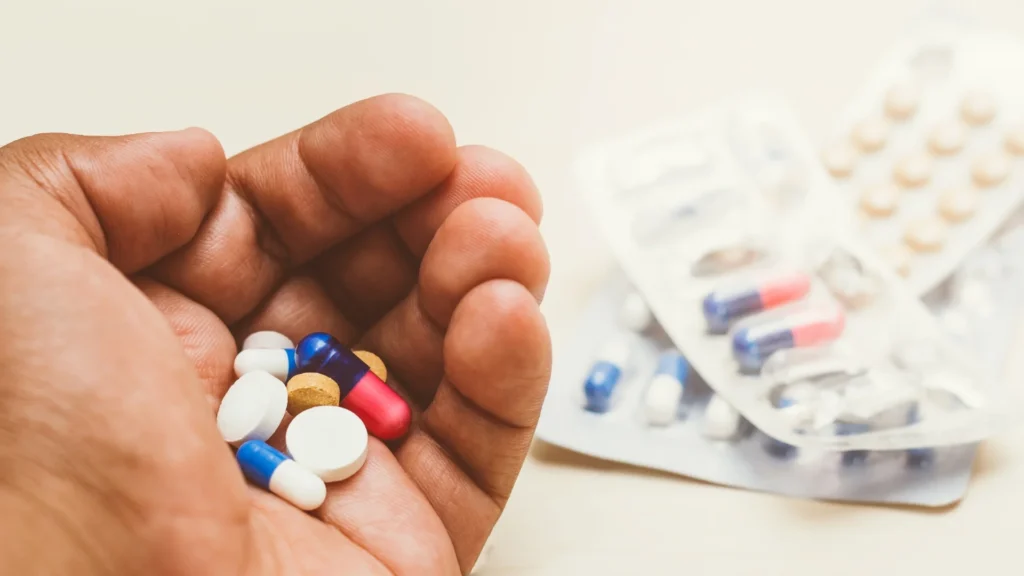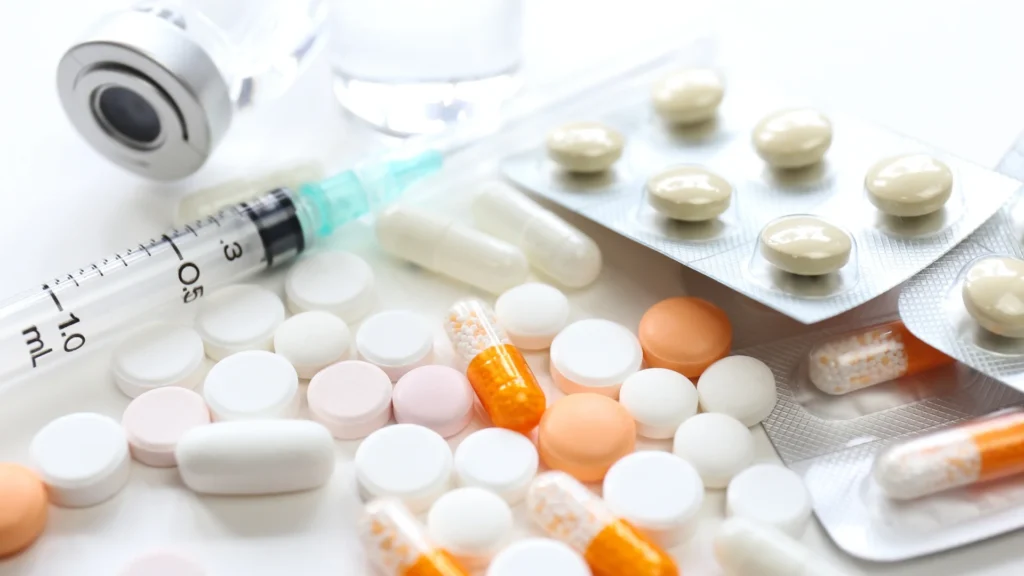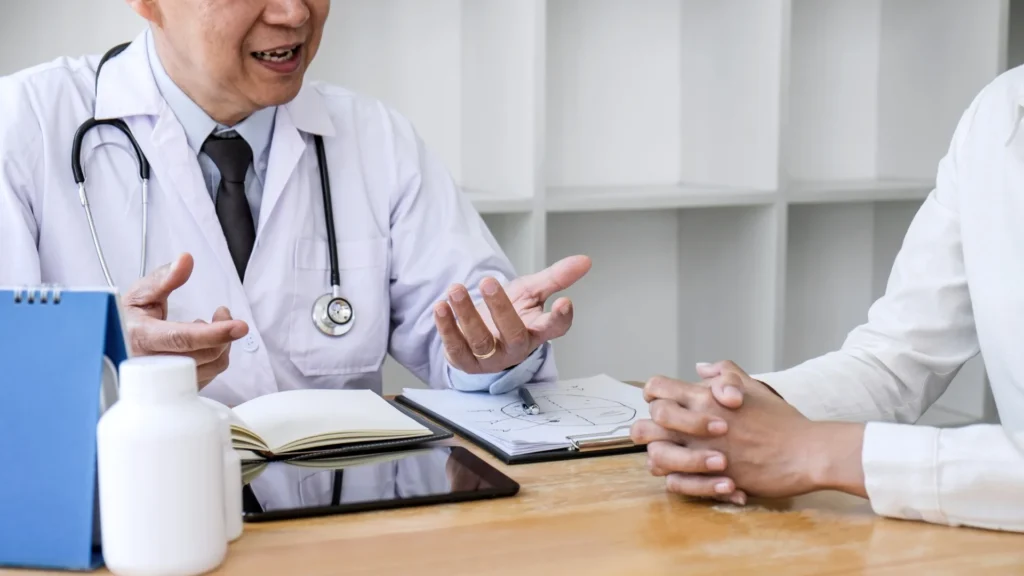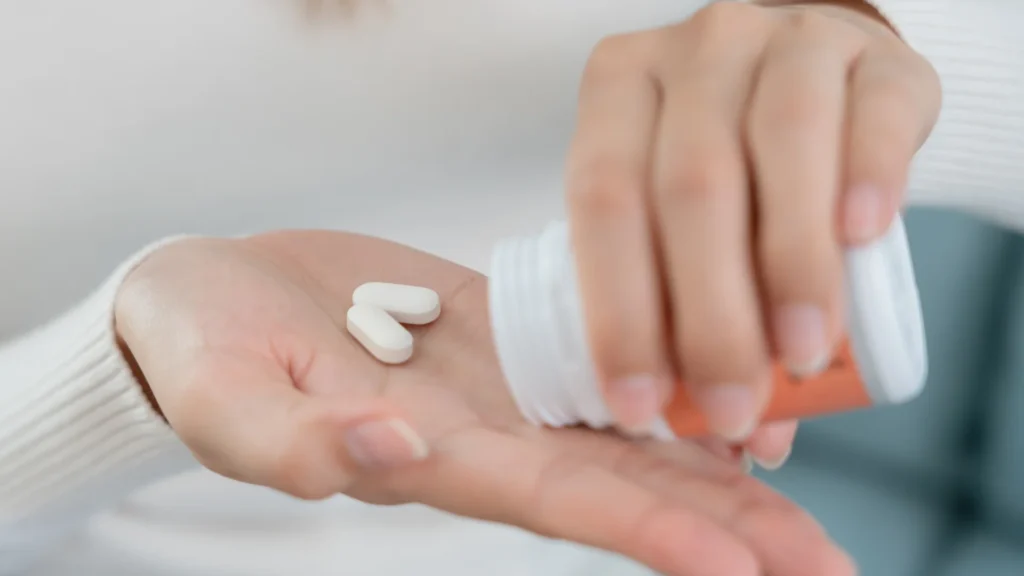In the busy world we live in, taking care of our health often becomes less of a priority. However, practicing self care, which involves activities that promote physical, mental, and emotional well-being, is crucial for overall health. One aspect of self care that needs careful thought is self medication – when we treat our own illnesses or symptoms with medications.
Self medication can be useful for minor issues like colds, coughs, or allergies. But it’s important to remember that it’s not a replacement for professional medical advice or treatment for serious conditions or severe symptoms.
In this article, we explore the concept of self medication. Our goal is to help you understand how to use it responsibly, especially during stressful times. We cover everything from what self medication means to when it’s necessary to consult healthcare professionals.
By the end of this article, you’ll have the knowledge and tools to effectively manage your health in stressful situations through responsible self medication.
The Importance of Self Care for Overall Well-being

The key to self care is understanding that physical health, mental health, and emotional health are closely connected. Each one affects the others, creating a balance that’s crucial for dealing with life’s pressures.
Physical Health: A Key Part of Self Care
Physical well-being often lays the groundwork for overall health. Here’s how to keep it in check:
- Proper Nutrition: Give your body what it needs by eating a balanced diet full of fruits, vegetables, lean proteins, and whole grains. Remember that food is fuel, and quality matters as much as quantity.
- Regular Exercise: Make time for at least 30 minutes of moderate physical activity most days. This could be anything from brisk walking to cycling or even gardening — any movement that gets your heart rate up and brings you joy.
- Adequate Sleep: Aim for 7-9 hours of sleep each night to let your body and mind recharge. Establish a calming bedtime routine and create a sleep-friendly environment.
These practical steps not only strengthen your body but also build resistance to stress. Making self care a regular part of your life is like putting on armor that helps you face challenges more effectively. Remember, taking care of your physical needs isn’t a luxury — it’s a necessity for building a strong base on which mental and emotional well-being can thrive.
By looking after our bodies through these actions, we set ourselves up for better ways of dealing with stress when it arises.
Understanding Self Medication

Self medication involves individuals treating their self-recognized illnesses with over-the-counter (OTC) or non-prescription medicines. Minor ailments like a common cold or a headache often prompt people to manage their symptoms with readily available medications.
Benefits of Self Medication
Here are some advantages of self medication:
Convenience
Access to treatment without the need for a doctor’s visit.
Cost-effectiveness
Potentially lower healthcare expenses.
Empowerment
Encouraging self-reliance and health literacy.
Risks of Self Medication
However, self medication also comes with its own set of risks:
Misdiagnosis
Treating symptoms without professional diagnosis can mask underlying conditions.
Drug Interactions
Uninformed use might lead to adverse interactions with other medications.
Inappropriate Use
Incorrect dosages or durations can result in reduced effectiveness or side effects.
Stressful situations often drive individuals towards self medication as a quick fix. Distress can cloud judgment, leading to decisions that prioritize immediate relief over long-term health. Common stress-induced scenarios include:
- Work Pressure: Reaching for pain relievers to manage tension headaches.
- Sleep Disturbances: Using OTC sleep aids to combat insomnia.
- Emotional Stress: Resorting to anti-anxiety supplements in lieu of professional counseling.
Recognizing the reasons behind this trend is crucial for addressing the root causes of stress and promoting responsible use of medicines. Moving forward, it’s imperative to discuss how one can practice self medication responsibly while navigating the stresses of daily life.
Guidelines for Practicing Self Medication Responsibly

In Singapore, medications are categorized into three classes, each with specific regulations and levels of accessibility:
1. OTC medication
This group includes over-the-counter medicines that are readily available and typically have few side effects. They can be purchased without a prescription for the treatment of minor ailments.
2. Pharmacy only medication
These require a consultation with a pharmacist who can offer advice on use. While not requiring a doctor’s prescription, they still necessitate caution due to potential side effects.
3. Prescription only medication
Reserved for more serious conditions, these medications are accessed solely with a doctor’s prescription, indicating a need for professional oversight.
When self medicating, especially for minor ailments, making informed decisions is crucial. Here are key considerations to ensure responsible self medication:
- Understand the correct usage of the medication, including dosage and duration.
- Be aware of potential side effects and interactions with other medications you may be taking.
- Keep track of your allergies and any chronic medical conditions that could be affected by self-medication.
- Always read labels carefully and verify that you’re selecting the appropriate medication for your symptoms.
By adhering to these guidelines, individuals can responsibly manage minor health issues while minimizing risks associated with self medication. Moving forward, it’s also essential to recognize situations where different types of stress-related minor illnesses may arise and understand how to address them effectively.
Common Types of Stress-Related Minor Illnesses

High levels of stress can manifest physically, often triggering a range of minor ailments like allergic rhinitis and cough/cold infections. These conditions, while not life-threatening, can significantly impact daily functioning and overall quality of life.
Allergic Rhinitis
Allergic rhinitis, commonly known as hay fever, is characterized by symptoms such as:
- Sneezing
- Itchy and runny nose
- Watery eyes
Stress doesn’t directly cause allergic rhinitis but can exacerbate these symptoms. To address this condition, consider non-pharmacological approaches like:
- Regular nasal irrigation: Using a saline solution can help clear irritants from nasal passages.
- HEPA filters: Installing HEPA filters in your home can reduce exposure to allergens.
- Stress management exercises: Yoga or meditation might indirectly relieve symptoms by lowering stress levels.
Cough/Cold Infections
A common cold, marked by a cough, sore throat, and congestion, can be aggravated by stress. While over-the-counter medications are available, non-drug strategies should also be part of your self care routine:
- Staying hydrated: Drinking plenty of fluids helps thin mucus and keeps mucous membranes moist.
- Warm teas with honey: These can soothe a sore throat and ease coughing.
- Humidifiers: Adding moisture to the air can relieve congestion and coughing.
In both cases, it’s crucial to monitor symptoms closely. If these simple self care measures aren’t helping or if symptoms escalate, it may be necessary to consult a healthcare provider for further advice.
Self Medication Strategies for Stressful Situations
Stressful situations are a part of life, and knowing how to manage them is crucial. While it’s essential to understand and address the root causes of stress, self medication strategies can provide immediate relief in the interim.
1. Relaxation Techniques
One effective self medication strategy involves using relaxation techniques. These techniques are designed to reduce physical tension and mental stress. Here are two examples:
- Deep breathing exercises: Try taking slow, deep breaths in through the nose and exhaling out through the mouth when feeling stressed. This simple action can help lower heart rate and blood pressure, promoting a sense of calm.
- Mindfulness exercises: Stay present in the moment rather than worrying about past or future events. This could be as simple as focusing on your senses while eating a meal or taking a walk outside.
2. Over-the-Counter Remedies
Over-the-counter remedies may also come in handy during stressful situations. These could include:
- Herbal teas known for their calming properties
- Supplements like magnesium that are known to support the body’s natural stress response system
However, it’s important to note that over-the-counter remedies should not replace professional medical advice and should only be used in accordance with their recommended dosages and guidelines.
Over-the-Counter Medications for Stress Relief: Do They Work?

When stress levels rise, many people turn to over-the-counter (OTC) medications for stress relief, hoping for a quick solution. These products, which include herbal supplements and sleep aids, are readily available in pharmacies and claim to provide calmness and improved well-being. But how effective are they really?
Herbal Supplements
Herbal supplements are derived from plants that have been used in traditional medicine for a long time. Here are some examples:
- Valerian Root: Primarily used as a sleep aid, it may improve sleep quality and ease anxiety.
- St. John’s Wort: Suggested for mild to moderate depression, though it can interact with other medications.
- Ashwagandha: An adaptogen that might reduce cortisol levels and perceived stress.
Sleep Aids
OTC sleep aids usually contain antihistamines like diphenhydramine or doxylamine. While they can make you feel drowsy and help you fall asleep, they should not be used for an extended period due to potential side effects such as daytime drowsiness or impaired cognitive function.
Evaluating Effectiveness and Safety
Scientific studies on these OTC products yield mixed results. Some evidence suggests that certain herbal remedies may provide mild benefits in alleviating stress symptoms. However, the effectiveness can vary greatly from person to person.
When considering the use of OTC medications for stress relief, here are some factors to keep in mind:
- Check for any potential interactions with your current medications.
- Carefully read the labels to understand the active ingredients and recommended dosages.
- Be aware of possible side effects like drowsiness or stomach discomfort.
- If you have existing health conditions or are pregnant, it’s best to consult with healthcare professionals before using these products.
Responsible usage of OTC medications involves paying attention to details and being mindful of your own health status. While these products may offer some benefits, they should not be seen as a replacement for comprehensive stress management strategies or professional medical care when necessary.
When to Seek Professional Help

Self-medication has its place in managing minor ailments, especially under stress; however, recognizing the limitations of self-medication is critical for your health and safety. It’s essential to seek professional medical advice in situations where:
- Symptoms persist: If there’s no improvement after a reasonable period of self-treatment, it’s time to consult a healthcare provider.
- Conditions worsen: Any escalation in symptoms or the appearance of new, more severe symptoms warrants immediate professional attention.
- Unfamiliar symptoms arise: Experiencing signs that you cannot confidently attribute to a minor ailment should trigger a consultation with a healthcare professional.
Remember, the goal of self-care and self-medication is to maintain health and manage predictable, minor conditions. It should never replace the expertise and guidance of professionals, particularly when your health does not follow the expected course of recovery. After considering these factors, if doubt still lingers about the appropriateness of self-medication, reaching out to a healthcare provider is a prudent next step.
The Role of Healthcare Professionals in Supporting Self Medication Practices

Key to managing self-care appropriately is the establishment of open communication between individuals and their healthcare providers. This becomes even more vital when practicing self-medication. One tool which can assist in this exchange of information is the Patient’s Medication List (PML).
The PML, a comprehensive record of your medications, serves as a crucial bridge between self-care and professional healthcare support. By keeping an up-to-date PML, you facilitate safe and coordinated care, ensuring that your healthcare provider is aware of all medications you are using. This helps prevent potential drug interactions or overdoses.
Engaging with healthcare professionals does not only involve sharing your PML but also actively seeking their expertise and advice. Doctors and community pharmacists are invaluable collaborators in your self-care journey, offering guidance on suitable treatment options and advising on proper medication use.
Here are a few ways to effectively engage with healthcare professionals:
- Ask about the potential side effects of medications.
- Inquire about possible interactions with other drugs or health conditions.
- Seek clarification if instructions on medication use or storage aren’t clear.
- Discuss symptoms, particularly if they persist or worsen over time.
Remember, self-medication is not a solitary practice but one that requires a responsible approach and open dialogue with healthcare professionals for it to be beneficial and safe.
Conclusion
The delicate interplay between self care and professional healthcare support becomes vividly apparent when faced with stressful conditions, such as those seen during the COVID-19 pandemic. The crisis underscored the critical nature of maintaining one’s health through both personal initiatives and expert guidance.
- Self care stands at the forefront of promoting overall well-being, equipping individuals with the tools to manage everyday stressors while fostering healthy lifestyle habits.
- Self medication, when approached with caution and knowledge, can serve as a pivotal component of self care by addressing minor ailments promptly and effectively.
- Yet, it is essential to recognize that this practice must be navigated carefully to avoid the pitfalls of indiscriminate use, which could lead to complications or mask symptoms of more serious conditions.
By valuing both self-directed practices and the expertise of healthcare professionals, individuals can cultivate resilience during times of stress without compromising safety. It’s about finding that equilibrium where autonomy in health-related decisions is balanced with a respect for the nuanced complexities of medicine that only trained professionals can fully address.
Read More: 7 Easy Tips for Better Mental Well-being That Work
FAQ
1. What is self-care and why is it important?
Self-care refers to the actions we take to maintain or improve our physical, mental and emotional health. It’s essential because it helps manage stress, promotes overall well-being, and can prevent minor health issues from becoming major problems.
2. What is self-medication?
Self-medication involves individuals treating self-recognized illnesses or symptoms with medicines. It’s crucial to note that this practice should only be used for minor illnesses and not chronic conditions or bacterial infections.
3. What are some minor illnesses that can be treated with self-medication?
Minor illnesses suitable for self-medication include allergic rhinitis, coughs/colds, acne, conjunctivitis, motion sickness, and minor wounds among others.
4. How do I ensure safe self-medication?
Before using any medication, ensure you know its brand name, active ingredients, use, warnings, side effects, interactions, proper use and storage. Always maintain an accurate Patient’s Medication List (PML) and consult healthcare professionals when needed.
5. When should I seek professional help instead of self-medicating?
Professional medical advice should be sought if symptoms persist or worsen over time. Certain symptoms such as chest pain, fever for more than 24 hours or persistent bleeding also require immediate professional attention.
6. How can I engage with doctors and community pharmacists in my self-care journey?
Open communication is key. Ask relevant questions about your treatment options and always bring your PML during healthcare visits for safer and coordinated care.


